 Grungy is the word I use to describe
Grungy is the word I use to describeAll the dust and the dirt and treasures that the owner likes to hide...
(with apologies to Terry Kirkman)
Ok it doesn’t exactly rhyme. But then neither does the original (describe / inside). Anyway I’m thinking here of used records stores, where you’d see collectors items worth $50 or $100, then off in the corner and under the bins you’d see boxes of old scratched up barely playable records for 50 cents each. Then you’d be running your fingers over dozens of random 45s looking for that odd ball song you’d been seeking forever.
And dust. Everywhere. Tons and tons of dust, more and more dust. I’d walk out of Pyramid or Comic World with black fingers, smudges on my shirt, my eyes smarting...
...which brings me to Into The Music, the cleanest, best organized, classiest used record store ever. It was in Osborne Village (it's in the Exchange District now, apparently), just across the bridge from downtown, and you’d have to pass the legislative buildings and memorial park if you’re heading that way. The owner’s name was Greg (still is Greg, just that the place now is part of my past) and he was fussy. He had high standards for quality of the vinyl and quality of the product. So there wasn’t a lot of junk in boxes, no hidden treasures and not so much dust. (Ok, there was one time when he had a special bin of special priced stuff, but even then, I picked up Kris Kristofferson (Border Lord) and The Band (Stage Fright) and the condition wasn’t so bad. Then another time he opened up the basement, where he had tons of garage sale quality junk, and I must have spent hours looking but I came away empty handed.)
I sold a lot of records there, and traded a lot, didn’t buy a lot for cash, some. But that’s where I got this record, a collection by Little Willie John, on some label that specialized in bogus recordings. What they’d do is find some has-been, haul him into the recording studio to redo his old hits, and then sell it, stating in tiny print (if at all) that the recordings herein were rerecordings by the original artist. But given that LWJ died in 1968 (in Washington State Prison as it happens) it wasn’t likely that he’d rerecorded these. And so he hadn’t; these are originals.
5 of his 13 top 100 hits are here. The time range is late 50s – early 60s.
Little Willie John:
• Fever – Better known by Peggy Lee, this was a hit for LWJ in the summer of 1956. Lee changed the words, LWJ’s version, which presumably was the original, though he didn’t write it, is much more elaborate. Still, I know it’s heresy, but I prefer Lee’s rendition; it has a lot more character; it identifies itself more profoundly. The McCoys put this back on the chart in the fall of 1965, in a Hang On Sloopy soundalike version. Elvis covered it on one of his early 60s albums as well.
• Let Them Talk – A song of defiance, love in the face of adversity. They’re trying to break up our romance, sings, LWJ. I wonder why? Maybe she is white, maybe they are too young, maybe she is a he. Who knows. From the winter of 1960, reached number 100.
• I’m Stickin’ With You Baby – A song of fidelity and commitment. Reminds a bit of Close To You by Willie Dixon (recorded by Muddy Waters).
• Talk To Me, Talk To Me – A song not about communication, just talk to me, sings LWJ. Some times even guys just want to talk. But then “tell me the words I want to hear” brings it back into that masculine realm of utilitarianism. This was a hit in the spring of 1958.
• Person To Person – Telephone terminology way back when, used in a romantic context, but what it’s about is separation.
• Suffering With The Blues – A bit on the haunting side. This was kind of generic LWJ, but in a good way.
• Sleep – How we love to sleep, he sings. Well ok. Is he really singing about sleep? A hit in the fall of 1960.
• Letter From My Darling – Just a song about a love letter.
• All Around The World – Another song of undying love. Little Milton covered this, but he called it Grits Ain’t Groceries (All Around The World).
• Need Your Love So Bad – When the night begins… A song of intense longing. Fleetwood Mac did a knock em dead version of this, in their Peter Green days.
• Leave My Kitten Alone – There is a version of The Beatles doing this on Anthology 1. I wonder what his “kitten” thinks of this. From the summer of 1959.
• You Hurt Me – You hurt me when you let me go, sings LWJ, stating what I would consider to be the obvious. Come back to me he sings, or you will drive me to my grave. Where are her feelings in all this?
• Don’t Play With Love• Big Blue Diamonds – Same idea as Gary Lewis & The Playboys’ This Diamond Ring, how the ring loses its meaning when the romance is over.
• Young Girl – Not the Gary Puckett & The Union Gap song, but same idea. LWJ’s heart is captivated.
• My Nerves – A strange expression of infatuation.
• Spasms – Ok, don’t even go there.
• I’m Shakin’ – You start with fever, and before you know it you’re shakin’, and that leads to spasms, and etc…
• You Got To Get Up Early In The Morning – A song about cheating and gullibility.
• I Hate To Leave You – Guy finds a letter from his girl…
• It Only Hurts A Little While – A guy treats his impending heartbreak philosophically
• I Like To See My Baby – A song about physical attractiveness.
• Love, Life, And Money – More philosophy, if it’s gotta rain, why does it have to fall on me. Brings to mind Bobby Bland, somewhat.

 This totally does not belong here. I can not remember where I got it; it may even have been Value Village. Freddy Martin’s Greatest Hits, music from before our time period, but here it is, filling a hole between Tex Ritter and Hugo Winterhalter. That’s the thing, holes. So I’d have to find things to fill them. And voila! Freddy Martin. And there you go…
This totally does not belong here. I can not remember where I got it; it may even have been Value Village. Freddy Martin’s Greatest Hits, music from before our time period, but here it is, filling a hole between Tex Ritter and Hugo Winterhalter. That’s the thing, holes. So I’d have to find things to fill them. And voila! Freddy Martin. And there you go… Most country music is not cowboy music, and, if you ask Ian Tyson, he will tell you that cowboy music is not country music. Tex Ritter, though, was a country singer who did cowboy music. Make no mistake. And he is as corny as they come.
Most country music is not cowboy music, and, if you ask Ian Tyson, he will tell you that cowboy music is not country music. Tex Ritter, though, was a country singer who did cowboy music. Make no mistake. And he is as corny as they come.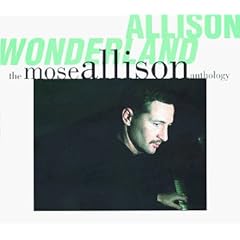 I knew Mose Allison the same way I knew Willie Dixon; his name was on umpteen songs. Well it seemed to be. Really it was just a few. But I never heard a note he sang or played until I picked up Allison Wonderland at the HMV store in Garden City Shopping Centre. And all the Mose Allison I’ve ever heard is on that. I have the CD, actually own it. The songs here are the ones that fit on cassette, so there is one or two missing.
I knew Mose Allison the same way I knew Willie Dixon; his name was on umpteen songs. Well it seemed to be. Really it was just a few. But I never heard a note he sang or played until I picked up Allison Wonderland at the HMV store in Garden City Shopping Centre. And all the Mose Allison I’ve ever heard is on that. I have the CD, actually own it. The songs here are the ones that fit on cassette, so there is one or two missing.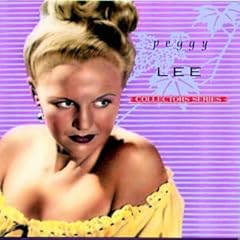 time. I hadn’t heard of her then, but the audience obviously had, judging by the reception.
time. I hadn’t heard of her then, but the audience obviously had, judging by the reception.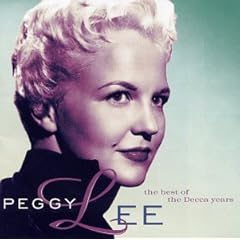 Tonight
Tonight something like that?
something like that? Jazz pianist and band leader, recorded with Billie Holiday.
Jazz pianist and band leader, recorded with Billie Holiday. Another crooner. The world was full of crooners; they were mainstream. In the 60s crooners became “your parents’ music.” Then they became fossils, as the rock and roll generation became adults. I don’t know what their status is now; there are some around, I think they are some kind of esoteric taste in today’s world.
Another crooner. The world was full of crooners; they were mainstream. In the 60s crooners became “your parents’ music.” Then they became fossils, as the rock and roll generation became adults. I don’t know what their status is now; there are some around, I think they are some kind of esoteric taste in today’s world.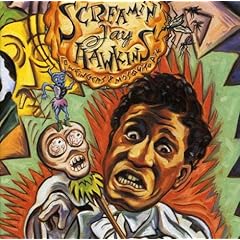 One of the more colourful figures in Rock / R & B history, the template for Arthur Brown, Tom Waits, Alice Cooper (sort of). The collection is called Cow Fingers And Alligator Pie, and it came from the West Kildonan Library. I don’t think this is the whole thing…
One of the more colourful figures in Rock / R & B history, the template for Arthur Brown, Tom Waits, Alice Cooper (sort of). The collection is called Cow Fingers And Alligator Pie, and it came from the West Kildonan Library. I don’t think this is the whole thing…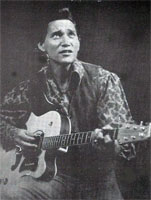 From Sun Records in Memphis, Tennessee comes Billy Lee Riley, who didn’t have a hit (such as it was) until 1972, by which time Sun Records had been acquired by the Shelby Singleton Corporation and was on its way to being history. The song was I Got A Thing About You Baby on the Entrance label, a song that Elvis also did, and I don’t have it. The ones I do have are from the 50s, and I got them from a Sun compilation that I found at the Centennial Library.
From Sun Records in Memphis, Tennessee comes Billy Lee Riley, who didn’t have a hit (such as it was) until 1972, by which time Sun Records had been acquired by the Shelby Singleton Corporation and was on its way to being history. The song was I Got A Thing About You Baby on the Entrance label, a song that Elvis also did, and I don’t have it. The ones I do have are from the 50s, and I got them from a Sun compilation that I found at the Centennial Library.
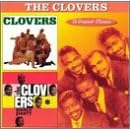 of 1959. The Searchers put it back in the top 10 in 1964. I have a version somewhere by Gary Lewis And The Playboys. The version, by the way, on the American Graffiti soundtrack was slightly different, with a reference to love potion number 10 somewhere toward the end, and I understand that that was not the original recording.
of 1959. The Searchers put it back in the top 10 in 1964. I have a version somewhere by Gary Lewis And The Playboys. The version, by the way, on the American Graffiti soundtrack was slightly different, with a reference to love potion number 10 somewhere toward the end, and I understand that that was not the original recording. I’m fairly sure that I got this single at Argy’s. That’s all I can tell you.
I’m fairly sure that I got this single at Argy’s. That’s all I can tell you. Yet another doo-wop harmony type group.
Yet another doo-wop harmony type group.
